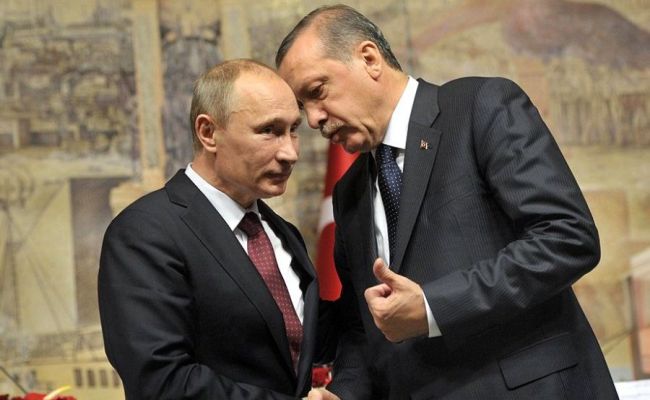There is no rapprochement between Russia and Turkey, just common strategic concerns, Dimitrios Triantaphyllou, Director, Center for International and European Studies (CIES), Kadir Has University, has told an online news conference for Armenian and regional mass media. He called on everyone not to forget that “Turkey is a NATO member. Therefore, for Russia that country is on the other side of the dividing strategic line and is not a friend.”
In this light, the expert addressed the Turkish Stream project saying the implementation of the project does not depend on the domestic political events in Turkey or elsewhere. It depends on how viable the project is and whether it meets the national interests of both Turkey and Russia, the expert said. Most political forces support the idea saying that Turkey must become the region’s energy center and the Turkish Stream project must be considered in the given context, an EADaily correspondent quotes Triantaphyllou as saying.
Most of the questions addressed to the expert were in some way or other about the past (June 7) parliamentary elections in Turkey. To recap, the ruling Justice and Development Party (AKP) received only 40.8% of votes losing the opportunity to form the government independently. The three opposition parties having discrepancies with AKP shared nearly all the remaining votes: the left-of-center Nationalist Democracy Party (MDP) - 25.2%, the Nationalist Movement Party (MHP) received 16.5% of votes, and the pro-Kurdish People's Democratic Party (HDP) overcome the threshold to the parliament for the first time with 12.9% of votes.
Here is a summary of Dimitrios Triantaphyllou’s answers and theses in brief:
• The outcome of the parliamentary elections and the changes they have triggered were not unexpected. Those changes began emerging yet in the course of the presidential election in August 2014 when Erdogan could win with almost 52% of votes, but Selahattin Demirtas, leader of the pro-Kurdish People's Democratic Party (HDP), received nearly 10% of votes. That was the first sign of changes… Demirtas’ breakthrough was irreversible, as many liberals, especially the ones who received their posts after the protests in Gezi Park, supported HDP.
• President of Turkey Recep Tayyip Erdogan is the cleverest politician in Turkey now. He knows well when to push through and when to retreat. He knows whom to work with. It will not be a surprise if Erdogan’s AKP achieves a temporary agreement with the government. There is no point in saying that 40% of votes have become a defeat for Erdogan’s Party. AKP may retrieve the defeat at the next elections.
• It is too early to speak of the Armenian-Turkish normalization after the elections, as the political environment is not stable yet. On the other hand, more and more forces support the idea that Turkey needs a new policy that would help it have a bigger part in the region and settle at least part of its problems with the neighbors. Here is what the normalization of the relations with Armenia must be based on. “I think, they are paving a way towards normalization of the relations, but a real formal normalization will require more time,” the expert said.
Nevertheless, it is not known what forces will form the government. If formed shortly, the new government will not influence the relations of Turkey and Armenia, as it will face such prior issues as the economic situation, the Kurdish issue, the relations with Iraq and Syria. The ongoing rapprochement will not change either. The results will be felt when it is time.
The news conference was organized as part of the Region Research Center’s project “Dialogue International Press Center: Diversification of the International Information Sources for the Armenian Media” with the support of the OSCE Yerevan Office.

 In Russia, since the beginning of the year, mass blocking of bank cards and accounts of citizens has begun
In Russia, since the beginning of the year, mass blocking of bank cards and accounts of citizens has begun The Guardian: The sale of Greenland could be a disaster for Ukraine
The Guardian: The sale of Greenland could be a disaster for Ukraine The Daily Telegraph "revealed" the nuns "who financed the war on Ukraine"
The Daily Telegraph "revealed" the nuns "who financed the war on Ukraine" The United States has chosen a new platform to fight against Russia
The United States has chosen a new platform to fight against Russia Porsche and BMW stopped starting in Russia
Porsche and BMW stopped starting in Russia Medvedchuk told how Yermak is tied up with Zelensky
Medvedchuk told how Yermak is tied up with Zelensky